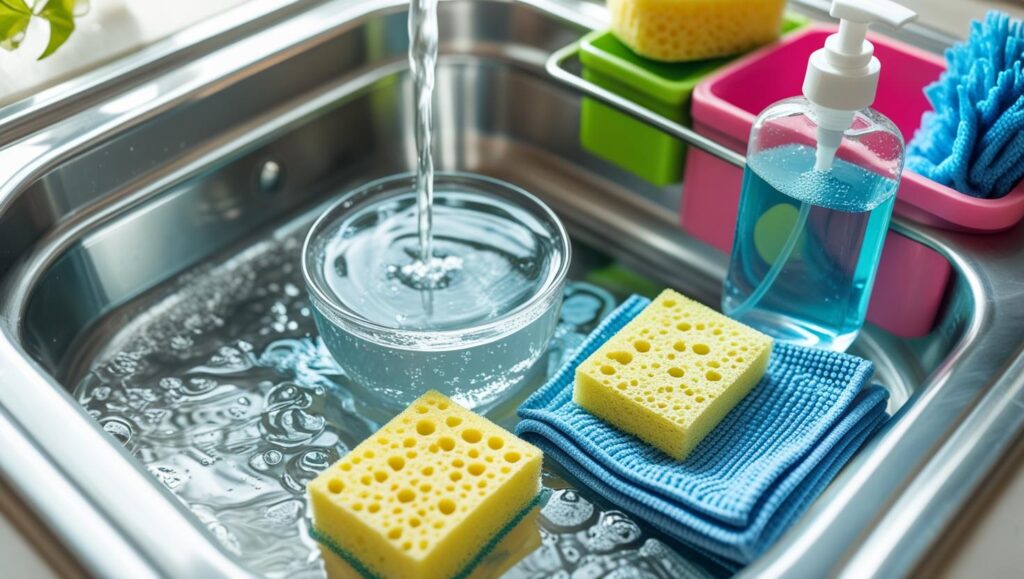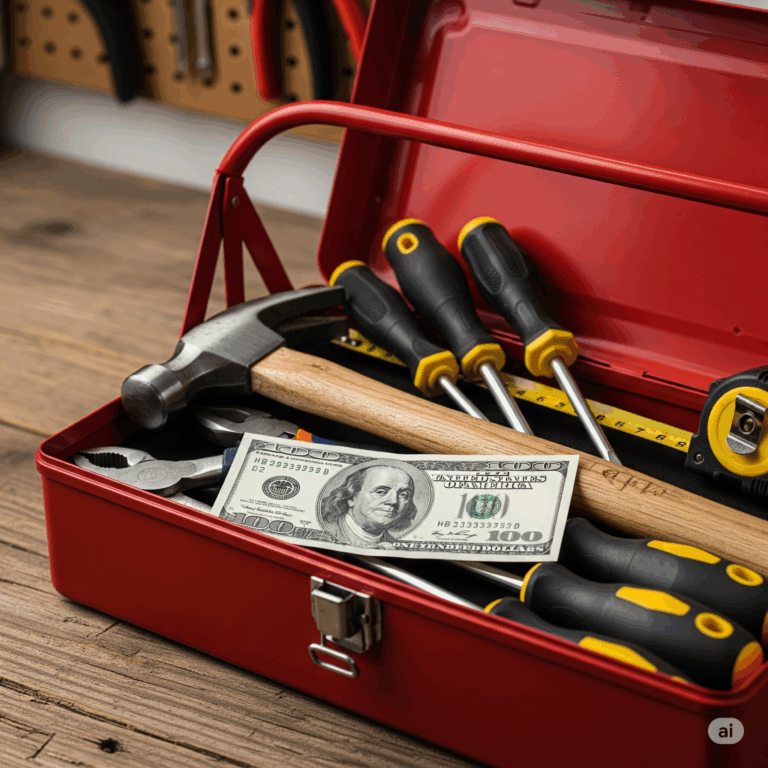Click here for our free printable House Cleaning Checklist.

Introduction:
Cleanliness is key to tenant satisfaction, property value, and regulatory compliance. Well-maintained properties attract responsible tenants, prevent maintenance issues, and support smooth lease renewals—especially in competitive markets like California, where strict tenant laws make upkeep essential.
This House Cleaning Checklist covers weekly, monthly, and seasonal tasks, plus specialized cleaning for move-ins, move-outs, and post-construction, ensuring efficient property management.
The Importance of Regular Cleaning in Property Management
Regular cleaning preserves property value, enhances tenant satisfaction, and reduces long-term maintenance costs.
1. Tenant Satisfaction and Retention
A clean property encourages lease renewals by ensuring:
- Strong First Impressions: Well-kept common areas attract tenants.
- Health & Hygiene: Clean spaces prevent health issues.
- Community Standards: A tidy environment promotes respect.
- Fewer Complaints: Proactive cleaning reduces tenant dissatisfaction.
- Long-Term Tenancy: Clean, secure spaces encourage renewals.
2. Preserving Property Value Through Regular Cleaning
Routine cleaning prevents damage, extends material lifespan, and reduces costly repairs.
- Prevent Wear & Tear: Avoid floor, wall, and appliance damage.
- Maintain Plumbing & HVAC: Clean systems run efficiently and last longer.
- Stop Mold Growth: Regular cleaning prevents costly remediation.
- Enhance Curb Appeal: A well-kept property attracts quality tenants and boosts value.
3. Legal Compliance and Safety in Property Management
Regular cleaning ensures sanitation law compliance, tenant health, and legal protection.
- Habitability Laws: Cities mandate pest control, mold prevention, and clean spaces.
- Legal Protection: Poor upkeep can lead to fines, lawsuits, or license revocation.
- Health & Safety: Prevents disease, allergens, mold, and fire hazards.
4. Cost Savings in Property Management Through Regular Cleaning
Routine cleaning prevents expensive repairs, emergencies, and extends material lifespan.
- Preventive Maintenance: Clean carpets save $1,500–$3,000 in replacements.
- HVAC Efficiency: Maintenance cuts energy costs by 30% and prevents $5,000–$10,000 in replacements.
- Pest Control: Preventative cleaning avoids $500–$2,500 in extermination costs.
- Water Damage Prevention: Reduces $500–$6,000 in mold and water damage repairs.
- Liability Reduction: Clear walkways prevent $10,000–$50,000+ in legal claims.
Weekly Cleaning Tasks
Weekly cleaning tackles deeper maintenance, preventing dust, grease, and allergens from building up. Neglecting these tasks can lead to long-term damage, pest infestations, and unsanitary conditions. Kitchens, particularly in shared spaces, need weekly deep cleaning to address food residue, grease, and bacteria, ensuring hygiene and safety.
Kitchen Areas
Deep Cleaning Appliances:
- Microwaves: Prevent hardened food residue and bacteria.
- Refrigerators: Avoid mold, odors, and spoiled food.
- Stovetops & Ovens: Remove grease to prevent fire hazards.
Why It Matters:
- Dirty appliances attract pests.
- Grease buildup increases fire risks.
- Moldy refrigerators can lead to tenant complaints and expensive replacements.
Sanitizing Countertops & Tables:
- Wipe and disinfect surfaces to eliminate bacteria and food residue.
- Check for sticky spots or spills that could attract pests.
Why It Matters:
- Prevents health risks from bacteria like E. coli and Salmonella.
- Unsanitized areas can spread illness in shared spaces.
Cleaning Sinks & Drains:
- Food particles and soap residue collect in drains, leading to clogs and unpleasant smells.
- Hard water stains and mold can develop around sinks, creating a dirty and unsanitary appearance.
Why It Matters:
- Blocked drains lead to costly plumbing repairs.
- Standing water in sinks attracts gnats and bacteria.
- Mold and mildew growth create potential health hazards.
Flooring Maintenance
Floors collect dirt and stains that can cause long-term damage. Weekly cleaning preserves appearance, prevents wear, and extends flooring life, reducing costly replacements.
How Weekly Maintenance Prevents Damage
Vacuuming Carpeted Areas
- Traps dust, pollen, and pet dander, improving air quality.
- High-traffic zones like hallways need frequent vacuuming.
Why It Matters:
- Excess dust can trigger allergies and respiratory issues.
- Neglected carpets wear out faster, leading to costly replacements.
- Pet-friendly properties see higher fur and dander buildup.
Mopping & Disinfecting Hard Floors:
- Regular mopping prevents dirt buildup, bacteria growth, and surface damage in high-traffic areas.
Why It Matters:
- Grimy floors become slippery and hazardous.
- Residue from cleaners can dull surfaces over time.
- Moisture exposure can warp unsealed hardwood floors.
Spot-Cleaning Stains:
- Address spills immediately to prevent permanent discoloration and lingering odors.
Why It Matters:
- Stubborn stains lower property appeal and tenant satisfaction.
- Some spills (oil, wine) can permanently damage flooring.
- Carpet stains trap odors, making rentals less desirable.
Monthly Cleaning Tasks
While daily and weekly cleaning focuses on high-traffic areas. You can also use the House Cleaning Checklist provided for monthly cleaning targets deep cleaning and maintenance tasks that prevent long-term wear and tear. These tasks not only keep the property looking well-maintained but also enhance tenant satisfaction, prevent costly damage, and ensure compliance with health and safety standards.
Deep Cleaning
Washing Windows inside and out:
- Windows collect dust, grime, and hard water stains, dimming natural light and reducing curb appeal.
Why It Matters:
- Clean windows create brighter, more inviting spaces.
- Neglected windows hurt curb appeal and may require costly replacements.
- Hard water stains can become permanent if not removed regularly.
Best Practice: Use streak-free or vinegar-based cleaners for interiors; hire professionals for high-rise windows.
Dusting Ceiling Fans, Vents & Light Fixtures:
- Ceiling Fans & Vents: Prevent dust, allergens, and pet dander from circulating.
- Light Fixtures: Remove dirt and bugs to maintain brightness and efficiency.
Why It Matters:
- Dirty vents strain HVAC systems and increase energy costs.
- Allergen buildup can trigger respiratory issues.
- Clean fixtures improve lighting and enhance the space.
Cleaning Baseboards, Trim, and Wall Corners:
- Dust and grime accumulate in overlooked areas such as baseboards, trim, and wall corners.
- These areas can develop scuff marks, dirt streaks, and even mold growth in humid environments.
Why It Matters:
- Neglected baseboards and wall corners can make an otherwise clean property look unkempt.
- Buildup of dirt in corners can attract pests, leading to infestations.
Exterior Maintenance
Power Washing Sidewalks, Patios, and Entryways:
- Sidewalks, patios, and driveways collect dirt, algae, and grime, creating hazards.
Why It Matters:
- Enhances curb appeal and maintains property value.
- Prevents slip hazards and reduces liability.
- Ensures compliance with HOA and municipal standards.
Inspecting & Cleaning Gutters:
- Clogged gutters cause leaks, foundation damage, and mold growth.
Why It Matters:
- Water damage from clogged gutters can be expensive to repair, especially if it affects roofing or siding.
- Proper drainage prevents soil erosion around the foundation, preserving landscaping.
Landscaping Maintenance:
- Untrimmed vegetation lowers curb appeal and creates safety hazards.
Why It Matters:
- Well-maintained landscaping increases property value and curb appeal.
- Overgrown plants near buildings can attract pests, including rodents and insects.
- In California, fire codes require regular brush clearance to reduce wildfire risks.
Seasonal factors like weather, humidity, foot traffic, and pests impact property maintenance. Adjusting cleaning routines ensures properties stay well-maintained, energy-efficient, and compliant with health and safety regulations.
Move-In/Move-Out Cleaning
A thorough cleaning is essential when tenants vacate a property to maintain hygiene, protect the unit, and ensure a smooth transition for new occupants.
1. Cleaning and Disinfecting the Entire Unit
Task:
- Sanitize high-touch areas (light switches, door handles, countertops).
- Wipe walls and baseboards to remove scuffs and stains.
- Scrub and disinfect kitchens and bathrooms.
Why It’s Important:
- Prevents germs, enhances tenant appeal, and ensures a fresh start.
2. Final Walkthrough and Tenant Welcome Preparation
Before handing over the keys, perform a final quality check to ensure everything is ready.
Tasks:
- Verify cleanliness and functionality.
- Test lights, plumbing, and locks.
- Provide a welcome packet with lease details.
- Add small touches like air fresheners or a welcome note.
Why It’s Important:
- Reduces move-in issues, boosts tenant satisfaction, and sets a positive tone.
3. Checking for Damage and Documenting the Unit’s Condition
Task:
- Inspect walls, flooring, and fixtures for damage.
- Take photos and notes for deposit records.
- Complete necessary repairs before move-in.
Why It’s Important:
- Prevents disputes, avoids costly repairs, and ensures a seamless transition.
A structured cleaning schedule ensures properties remain clean, safe, and well-maintained. It improves efficiency, extends property lifespan, and boosts tenant satisfaction.
Tip: Adjust cleaning frequency based on property type and tenant turnover. High-traffic areas need daily care, while deep cleaning (e.g., carpets, HVAC) should be scheduled seasonally to prevent costly damage.
Use of Eco-Friendly Cleaning Products
Using green cleaning products improves tenant health and minimizes environmental impact.
Benefits for Tenant Health
- Lower Chemical Exposure – Reduces respiratory issues and skin irritation.
- Better Air Quality – Fewer harmful fumes improve indoor environments.
- Safer for All – Ideal for homes with children and pets.
Environmental Benefits
- Biodegradable Ingredients – Break down naturally, reducing pollution.
- Lower Carbon Footprint – Sustainable production and packaging.
- Less Toxic Waste – Prevents chemical runoff into ecosystems.
Recommended Eco-Friendly Products
- Baking Soda – Natural cleaner and deodorizer.
- Vinegar – Disinfects and neutralizes odors.
- Castile Soap – Plant-based, all-purpose cleaner.
- Certified Green Products – Look for Green Seal or EcoLogo labels.
- Microfiber Cloths – Clean effectively with less product use.
Conclusion
We hope you enjoyed reading our guide to House Cleaning or downloaded our House Cleaning Checklist. A structured cleaning routine helps property managers maintain their buildings efficiently. Regular cleaning enhances property value, ensures compliance with California laws, and improves tenant satisfaction. By following this checklist and staying proactive with seasonal maintenance, property managers can reduce long-term costs and maintain a safe, welcoming environment.
If you need professional cleaning services, contact us to learn more about custom cleaning solutions for your property.
Ready to streamline your inspections? Contact us for more tips or assistance!
Turn Your Passion for Property Management Into Profit
Join our franchising program and learn how to become a successful property manager. We provide all the training and support you need to build your business. Learn More About Franchising Opportunities and take the first step today!
Let us handle the day-to-day operations while you enjoy hassle-free ownership. From tenant relations to maintenance, we’ve got it covered. Contact Us! Today to learn more about our property management services!



